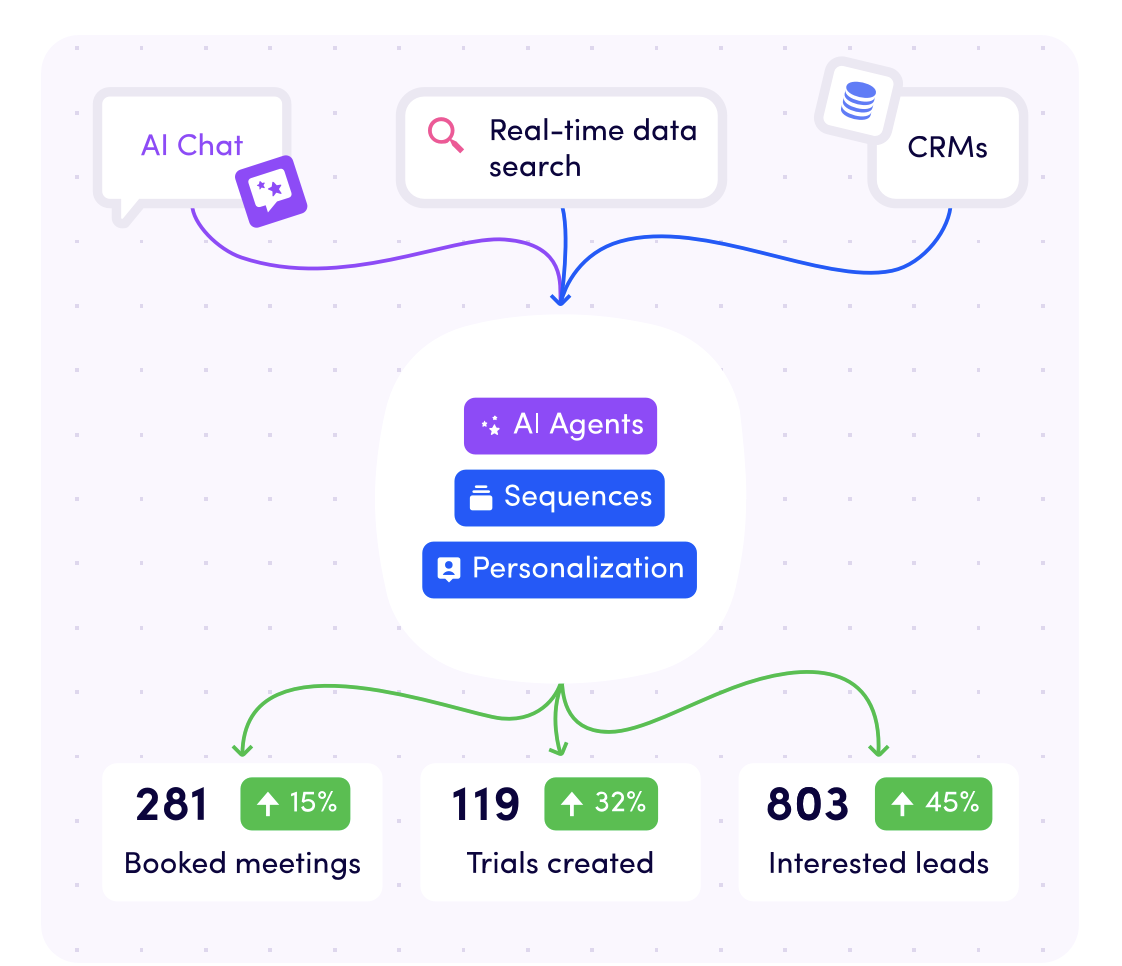
Imagine a world where loans are approved in seconds. Sounds futuristic? Well, we are very close to making it our reality...
Welcome to the future of finance!
Thanks to artificial intelligence pushing the finance industry to new heights.
From instant loan approvals to hyper-personalised customer experiences, AI is rewriting the rules.
If you’re curious about the future, you’re in the right place!
Join us as we explore how AI pushes the finance industry to innovate faster than ever.
Let's get started!
This article will cover:
- What is AI in Finance?
- AI in Finance: Key Applications and Top Companies
- Key Benefits of AI in the Finance Sector
- Challenges and Ethical Considerations in Financial AI
- Conclusion
What is AI in finance?

Curious about how banks are using technology to remain competitive?
Well, that's where artificial intelligence (AI) steps in!
In the financial industry, AI helps lower costs and speeds up decision-making. Besides, it also improves accuracy!
But it’s not just about saving a few pennies (or, you know, millions).
Did you know that updating banks with AI systems can reduce operating costs by up to 30%?
It also cuts the time to launch new products in half!
But it's not just about efficiency...
By leveraging AI-driven data insights, financial institutions gain the edge they need to stay competitive.
This technology helps them customise services and improve customer satisfaction.
So let's explore how financial companies and banks can apply AI-powered systems!
AI in Finance: Key Applications and Top Companies

Faster, smarter, stronger—AI pushes the financial industry to new heights.
Just in 2023, the financial services industry invested about $35 billion in AI!
From spotting fraudulent transactions in seconds to making personalised services, AI is transforming how this industry operates.
Here's a look at the most impactful applications:
1. Fraud Detection and Prevention

Catching fraud before it happens? That’s AI’s superpower.
With real-time transaction monitoring and identification of unusual patterns, AI identifies suspicious activity instantly.
That prevents financial losses and boosts security! How cool is that?
Here are the companies that operate in the fraud detection sector:
Feedzai utilises machine learning to detect and prevent fraud across the banking and commerce sectors.
Palantir Technologies provides data analytics platforms that assist in identifying fraudulent activities and reducing cybersecurity threats.
2. Personalised Financial Services

Forget the one-size-fits-all banking experience!
AI brings you the power of personalisation tailored to each individual customer.
By analysing data on individual customer behaviours, AI enables financial institutions to offer services that feel uniquely tailored.
This shift boosts customer satisfaction and engagement, setting a new standard for financial services:
Personetics Technologies uses AI-driven insights to craft a more personalised banking experience, delivering relevant and timely financial advice.
HighRadius brings AI-powered personalisation to financial services, allowing institutions to connect with customers on a more personal level.
3. Credit Scoring and Risk Assessment

AI enhances credit risk assessment and credit scoring by using non-traditional metrics.
This approach enables more inclusive and precise assessments, broadening access to credit:
Zest AI focuses on AI-driven underwriting, allowing lenders to make smarter, data-informed credit decisions.
Upstart uses AI to redefine loan approvals, expanding affordable credit access while improving risk accuracy.
4. Automated Trading and Investment Management

Speed is everything in trading, and AI is on top of it. AI algorithms analyse market trends and data in real time.
By analysing real-time market trends, AI-driven algorithms optimise trades and manage portfolios with precision:
Kensho specialises in AI-powered analytics for investment management, providing data-backed insights that support rapid trading decisions.
Trumid utilises AI to streamline fixed-income trading, enhancing the efficiency and performance of its trading platforms.
5. Customer Service and Chatbots

Need a question answered at 2 a.m.? AI chatbots are always here for you!
`
These tools improve customer experiences by reducing wait times and offering a personal touch:
Kasisto provides conversational AI tools that make banking more interactive and accessible, answering customer questions around the clock.
Clinc develops virtual assistants for banks, transforming how customers interact with their finances and making support available anytime.
6. Regulatory Compliance and Reporting

In a heavily regulated industry, compliance is key!
AI monitors transactions and automates reporting to ensure that institutions stay on the right side of the law.
Friss uses AI to help insurers comply with regulatory standards, monitor transactions for compliance issues, and detect fraudulent activities.
Behavox uses AI platforms to streamline compliance processes and manage cyber risks, supporting institutions in staying compliant without compromising efficiency.
7. Financial Document Analysis

Forget about the times of sorting through endless documents! Now it's a job for AI.
AI-powered tools extract, analyse, and organise information from financial documents, speeding up tasks like underwriting and due diligence:
Eigen Technologies offers solutions that automate document review, extracting essential data to enhance decision-making.
Ocrolus transforms paperwork into actionable insights with its AI-driven document processing, improving accuracy and efficiency.
AI in fintech isn’t just about automation—it’s reshaping how we interact with, understand, and manage money.
As innovations continue to emerge, AI’s role in finance will only expand, driving the industry toward smarter, more agile, and customer-focused operations.
Now that you know how AI is applied in finances, let's sum up the key benefits of using it!
Key Benefits of AI in the Finance Sector

Let's agree that AI is a powerful tool for finance.
It delivers a competitive edge by transforming processes, driving efficiency, and enhancing customer experiences.
So here are the top benefits that AI brings to the table in the finance industry:
1. Boosted Efficiency and Reduced Costs

Let’s face it: efficiency and cost savings are everything in finance.
By automating repetitive tasks, like data entry and transaction processing, AI allows teams to focus on higher-value work.
This cuts down operational costs and speeds up workflows, making processes smoother and more effective.
Did you know? By predictions, AI-driven automation can reduce financial service costs by up to 22%!
2. Enhanced Decision-Making with Data Insights

Finance has always been about numbers, and AI turns data into action.
By transforming raw data into actionable insights, AI gives financial institutions the power to make smarter, data-driven decisions.
AI algorithms dig into historical and real-time market data to forecast trends, helping companies stay one step ahead.
No more fortune-telling!
With this predictive edge, companies can better assess credit risk and optimise portfolios.
That creates strategies that align with the market’s next move!
3. Improved Customer Experiences

AI personalises finance like never before!
By analysing customer data, AI creates tailored experiences that make clients feel seen and valued.
Think of chatbots that provide 24/7 support or AI-powered apps that offer personalised financial advice.
These tools not only keep customers engaged but also help build long-term loyalty.
4. Stronger Security and Fraud Detection

Artificial Intelligence has become a cornerstone in enhancing security within the financial sector, particularly in fraud detection and prevention.
It identifies suspicious activity the moment it happens!
By analysing transaction patterns and identifying anomalies in real-time, AI systems significantly reduce the risk of fraudulent activities.
You should know that over 50% of banking institutions value AI and machine learning to detect new fraud cases and identify evolving fraud patterns.
This proactive approach allows banks to enhance security, reduce fraud risks and better protect their assets and customers.
Who wouldn't want that?
5. Scalability and Adaptability

The fast is the fact—AI scales easily.
It adapts to the needs of a growing business without requiring big infrastructure changes.
As companies expand or face market changes, AI tools seamlessly handle larger data volumes and tackle complex tasks without breaking a sweat.
Since transaction volumes and data complexity often fluctuate, scalability becomes crucial in the finance sector
So, with AI, financial services can grow while staying steady and flexible!
These benefits create a more efficient, secure, and customer-friendly financial sector.
As AI grows, its role in finance will become only larger and better!
Challenges and Ethical Considerations in Financial AI

With great power comes great responsibility...
So you should be mindful of the challenges that might arise on your way!
Here is a closer look at the key challenges and ethical issues in the financial sector:
1. Data Privacy and Security

AI systems thrive on vast data sets.
However, a lot of that data can be super sensitive!
Think of personal and financial info.
Imagine your bank not keeping your info secure—not a comforting thought, right?
The FCA survey revealed that 48% of consumers are worried about how financial institutions use their personal data, particularly with AI.
That’s why privacy and security are essential, not optional.
Regulations like GDPR are there to ensure companies don’t get too comfortable with your details.
Remember, the right balance between using data and protecting privacy is key to building trust!
2. Algorithmic Bias and Fairness

AI is a little... biased.
That’s right, even machines have prejudices—thanks to the data we feed them.
A model trained on biased data might make unfair calls on things like loan approvals.
It’s a problem when AI tells someone “no” for a loan just because of patterns it picked up along the way.
So, financial institutions need to keep a close watch and ensure that their AI systems are actually fair, not just pretending to be!
3. Transparency and Explainability

Who actually understands how complex machine learning algorithms operate? How do they handle decision-making processes?
When things aren't clear, it can break trust with customers and regulators alike.
The solution? Make things clear!
By creating AI systems that explain how they make decisions, we can help everyone stay on the same page.
This is super important in finance, where decisions can really change people’s lives.
So keeping things accountable and understandable is a win-win!
4. Regulatory Compliance

Can you imagine?
Organisations adopt Artificial Intelligence technologies faster than regulations can keep up.
Financial institutions are juggling the navigation of existing laws and creating new AI regulations.
But the smart move?
Engage with regulators, adhere to compliance, and prepare for AI-specific regulations.
It turns out that risk management and compliance are set to see the biggest growth in the AI governance scene!
Think of it as following the GPS—ignoring it won’t get you where you want to go.
5. Job Displacement and Workforce Impact

AI is incredible at handling repetitive tasks!
But there’s a catch: what happens to the people who used to do those jobs?
When AI takes over certain roles, the big question of job displacement within the financial sector arises.
The answer? Upskill your employees!
Help them adapt to their new AI-enhanced environment.
After all, we don’t want to replace people; we want to level them up.
That’s where Growth Tribe’s AI for Business course comes in.
This course is designed to equip teams with the essential AI skills needed to work alongside technology confidently and effectively.
Empowering your workforce with the right tools means embracing AI's potential while keeping your people at the centre of innovation.
6. Systemic Risk and Stability

AI in finance has brought speed and efficiency, but please- let’s not forget about stability!
AI in finance, especially high-frequency trading, could introduce systemic risks like increased market volatility.
Relying too much on automated algorithms without proper oversight can make markets more vulnerable and unstable.
So, creating strong and reliable AI systems with regulatory checks is important!
This keeps things stable and helps avoid any surprise problems as AI becomes more common in finance.
Conclusion
In the evolving world of finance, AI is quickly proving to be a game-changer.
It brings speed, precision, and personalisation reshaping everything from fraud detection to customer service.
With capabilities to enhance efficiency and security while reducing operational costs, AI has solidified its role in modern financial services.
As we move into this AI-driven future, we face challenges with data privacy, fairness, and regulations. These issues remind us that responsible use is essential!
As AI continues to advance, the financial sector has a unique opportunity to leverage these innovations wisely.
The path forward is clear: AI offers boundless potential, but it’s up to us to navigate it thoughtfully, keeping innovation and integrity at the heart of finance’s AI journey!
FAQ
1. What is AI’s role in the financial services industry?
Artificial Intelligence (AI) plays a transformative role in the financial services industry by enhancing efficiency, improving decision-making, and personalising customer experiences. From fraud detection to regulatory compliance and personalised financial advice, AI is driving operational improvements that help financial institutions save costs and streamline services.
2. How does AI improve fraud detection in finance?
AI enhances fraud detection by monitoring transaction history and identifying unusual patterns in real-time. Advanced algorithms flag fraudulent transactions as they happen, providing financial organisations with the tools to detect and prevent fraud instantly, thereby protecting assets and customer data.
3. What are the benefits of AI in the banking sector?
AI in banking delivers multiple benefits, such as boosted efficiency, reduced operational costs, and stronger security. AI-powered systems handle routine tasks, generate valuable insights from data, and improve customer satisfaction by personalising services—ultimately providing banks a competitive edge in today’s digital landscape.
4. How does AI assist with credit risk assessment?
AI models evaluate credit scores and assess credit histories with more precision than traditional methods. Using advanced algorithms and real-time data analysis, AI improves credit scoring accuracy, helping financial institutions offer fairer loan approvals and manage credit risk effectively.
5. What are the ethical concerns of AI in finance?
AI’s adoption in finance raises ethical concerns around data privacy, algorithmic bias, and job displacement. Financial services organisations must balance data usage with customer trust by ensuring transparency in decision-making processes and implementing regulatory compliance measures to protect sensitive information.
6. What are the risks associated with AI in financial markets?
AI in finance can introduce systemic risks, especially in capital markets and high-frequency trading. Over-reliance on automated algorithms may amplify market volatility, leading to financial instability. Ensuring human intervention and regulatory oversight can mitigate these potential risks.
7. How does AI enhance customer experience in banking?
AI-powered systems in banking personalise services by analysing individual customer data, creating a tailored experience. AI-driven chatbots offer 24/7 support, while recommendation engines provide personalised financial advice, resulting in higher customer satisfaction and stronger customer trust.
Categories
- Business & Innovation (83)
- Growth & Marketing (72)
- Artificial Intelligence (53)
- Data & Analytics (16)
- Case studies (10)
- Project Management (10)
Related articles
Latest articles
AI in Finance: Why You Need It Now
Imagine a world where loans are approved in seconds. Sounds...
ChatGPT Search Unveiled: Should You Make The Switch Now?
Picture this: You’re no longer just “searching” the web—you’re...
Shadow AI Explained: How to Harness Hidden AI Without the Risks
Picture this: your team is under pressure to deliver results—fast....
The 33 best AI tools for commercial teams
The tools are split into 2 categories The best AI tools for your...








